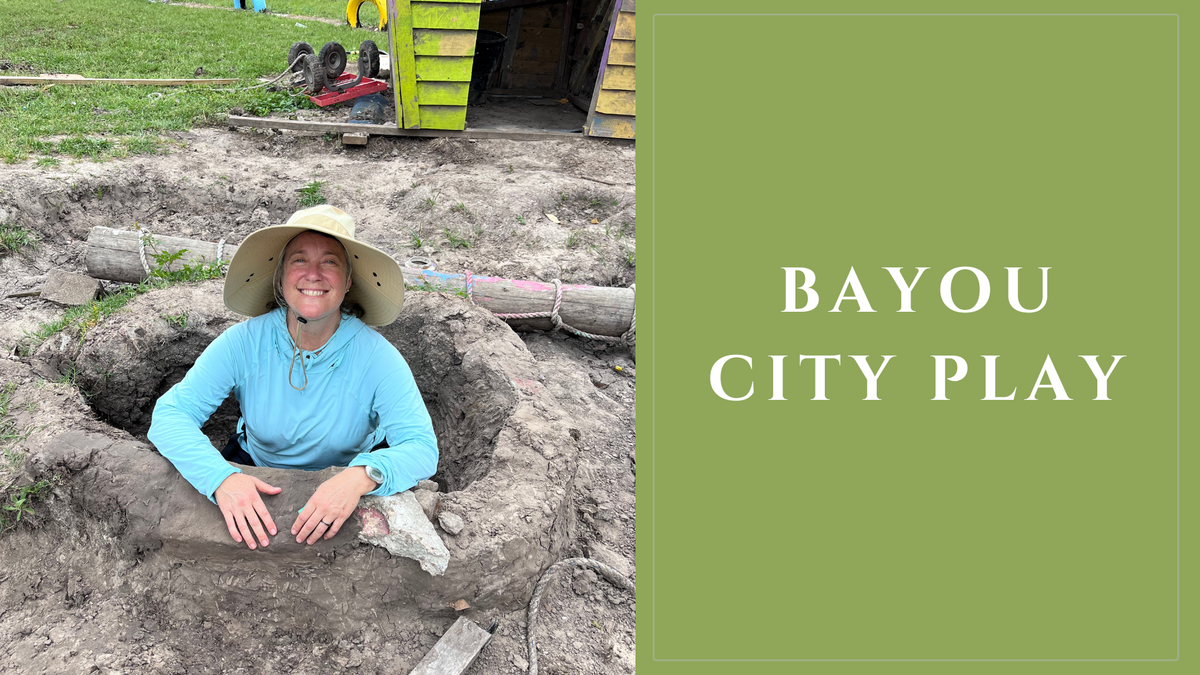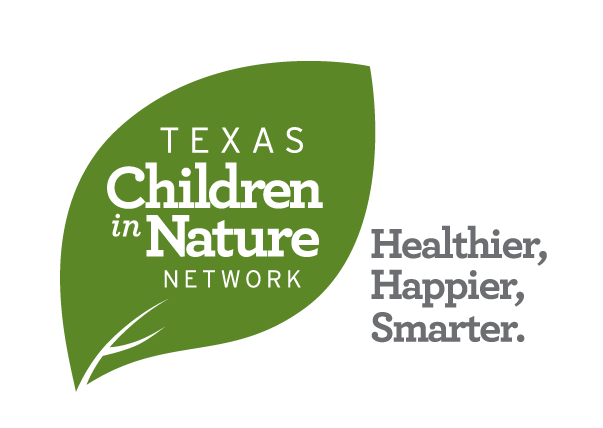
Bayou City Play
Jill met with Alice on February 9, 2024 to share more about Bayou City Play's work and new resources.
Jill, please introduce yourself and tell us a little about you:
My name is Jill and I’m a librarian and playworker. I founded Adventure Play at The Parish School in 2008. It is one of only a handful of adventure playgrounds in the United States and I am so grateful to be a part of it. Adventure playgrounds developed in Europe after WWII and are places where children can play freely with found materials (both natural and industrial). They are meant to compensate for the loss of children’s independent mobility and safety in urban settings. On our adventure playground children build structures with hammers and nails, they play with our goats, observe frogs and lizards, catch crawfish, climb trees, swing in hammocks, and collect pebbles, but more importantly, they build culture among themselves. They name things, make rules, determine their own goals and their own paths to get where they want to go. They figure out ways of distributing resources and resolving conflict that are different than what adults might teach but are better suited to everyone. And children are highly motivated to do things that are normally difficult/avoided, because the space and the process belongs to them.
Getting to be part of this has changed the way I see the world and I want to help build opportunities for children to do more of this - to have more voice, control, creativity, safety, to have more play in their lives. I also have a ten-year-old daughter who keeps me focused on centering children in my work and reminds me always that children are experts in their own play.
Please tell us about Bayou City Play and the work your organization is doing.
I founded Bayou City Play (BCP) in 2014 with several other playworkers, therapists, and artists to bring as much of our adventure playground to the Houston metro area as we could. We did this by setting up community play sessions in parks, libraries, a children’s hospital, schools, wherever we could find children and where people were willing to have us. Usually, we did this by partnering with organizations that were already serving children, bringing inexpensive materials (mostly boxes, tubes, fabric salvaged from the recycle bins), doing a loose set up and then opening it to child-directed play. While children played, we would talk to parents about the value of what was happening. Explaining that children were building risk-assessment and planning skills, they were learning to negotiate and self-advocate, they were figuring out what worked and what didn’t, while creating safety through a sense of ownership. The pandemic put a halt to these community play sessions, but we’ve reemerged with a focus on training people in playwork to do these set ups themselves.
Tell us a bit about the playwork training that you offer.
Children are experts at play, but adults have created all sorts of barriers to it. We build cities for cars without safe, continuous sidewalks or bikeways connecting children to parks, friend’s houses, libraries, and shops. We fill children’s days mostly with direct instruction in school, and after school activities that are structured by adults, who often establish both the process and product. We have prioritized commercial industry that makes the air unhealthy to run in, the soil unsafe to dig into, and removes the trees that would so perfectly provide the shade and challenging climbs. And we have distributed resources unfairly, based on race and class, so some children can play freely, but others are seen as suspect for simply being outdoors in public spaces. Adventure playgrounds were designed to compensate for these things, but not everyone can dedicate three acres to free play like The Parish School has. Compensating for so much requires a decided and directed approach to identifying and mediating those barriers, which is what playwork does so well.
Playwork is a professional approach developed on United Kingdom (UK) adventure playgrounds in mid to late 20th century. It identifies play as a human right and provides tools for working through the many barriers to play, both systemic and personal, and is adaptable to many contexts. It accounts for the realities and limitations of our respective spaces, asking us adults to find workarounds, but acknowledging that we can’t change things overnight, that we should start small and grow responsively.
I offer two introductory workshops through Bayou City Play, to get organizations started. I’m happy to do playground audits or more ongoing training, but the introductory talks, one on loose parts, the other on risk, provide a good foundation for starting small and growing responsively.
When organizations are interested in going deeper, there are a few exciting new resources here in Texas that I can guide them to. For instance, my friends at Free Play Houston (FPH)provide supports for play sessions, like what BCP did before the pandemic, so I work closely with Brett, Sabali, and Brooke of FPH to make sure people feel empowered to create pop-up playgrounds in their own communities.
What are the goals of the programs you are working on?
The goal is to get more child-directed play opportunities out there for children, in whatever capacity people are able, but to do that we need to remind adults of the importance of play. It’s in them! They were once children and play is where they discovered their strengths, where they built confidence and their identities and where they became so much of who they are today. But until adults remember, they will continue to make choices out of fear, rather than holding space for children to discover themselves.
How does Bayou City Play directly make a difference in helping kids and families connect to nature?
Nature, when tended to and respected, is the perfect playground. It has every single element a child needs. Through play in nature, children are free to interact with the world in a way that puts them within nature instead of on top of it. When we leave children to it, they will quickly dig in the dirt for hours, noticing all the details of the universe beneath their feet and relating that to all their senses. But if our efforts only involve direct teaching and activities we structure for the children, we are missing out on a lot of opportunities. This sort of connection takes time and requires adults to actively push against the barriers I mentioned before. Playwork gives adults language to talk about the value of children’s play, tools for balancing safety and risk, and the confidence to step back, while still being present.
Another thing I’ve noticed is that when adults are in nature, they remember childhood better, and as a result they trust their children to explore more freely. Playworkers love working with children in lush, balanced natural settings, because so much less is needed and the children look extraordinary. But like so much else, these settings aren’t available to everyone, so we need to figure out ways to bring nature to children. I grew up in an urban setting where nature felt hard to find. But one of the most vivid memories I have was playing at the fence line of a completely paved playground at school. That’s where the asphalt met the neighbor’s yard and we could collect eucalyptus pods, sticks, and leaves, and build tiny cities in the inches of dirt we found. But this took time, freedom, and a sense of safety. For children to make that connection we need to give them time to play, to explore on their own terms, and find the inches of dirt. It would be nice if they had more, but in the meantime, time and adult permission go a long way.
How can Texas Children in Nature Network be part of your work?
By connecting us with others who are doing this important work! We need one another and Bayou City Play has much to learn from everyone reading this partner spotlight.
Thank you, Jill, for your time today.
